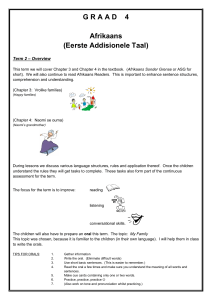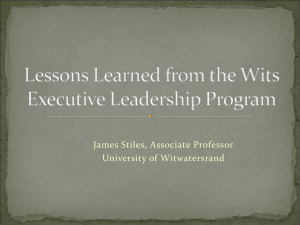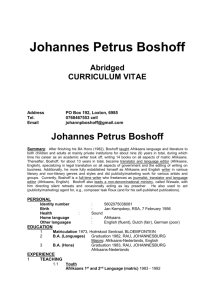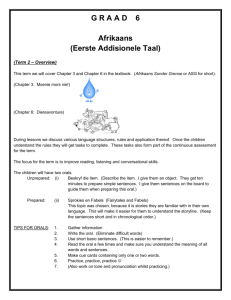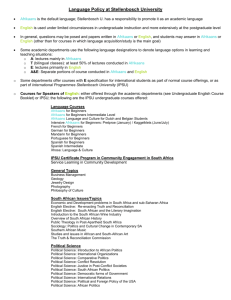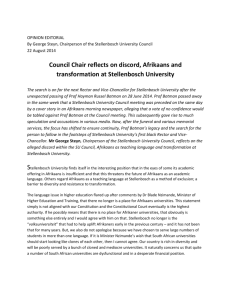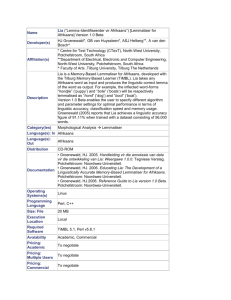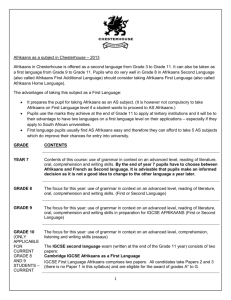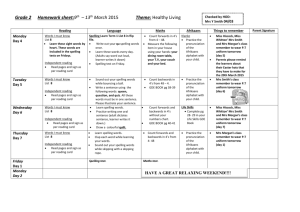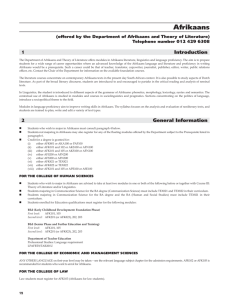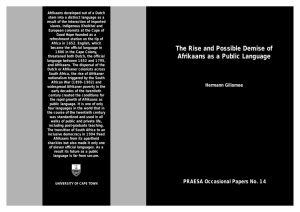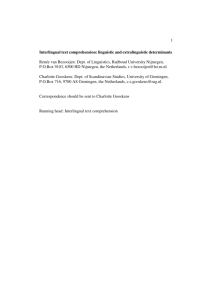value considerations - Universiteit Stellenbosch University
advertisement
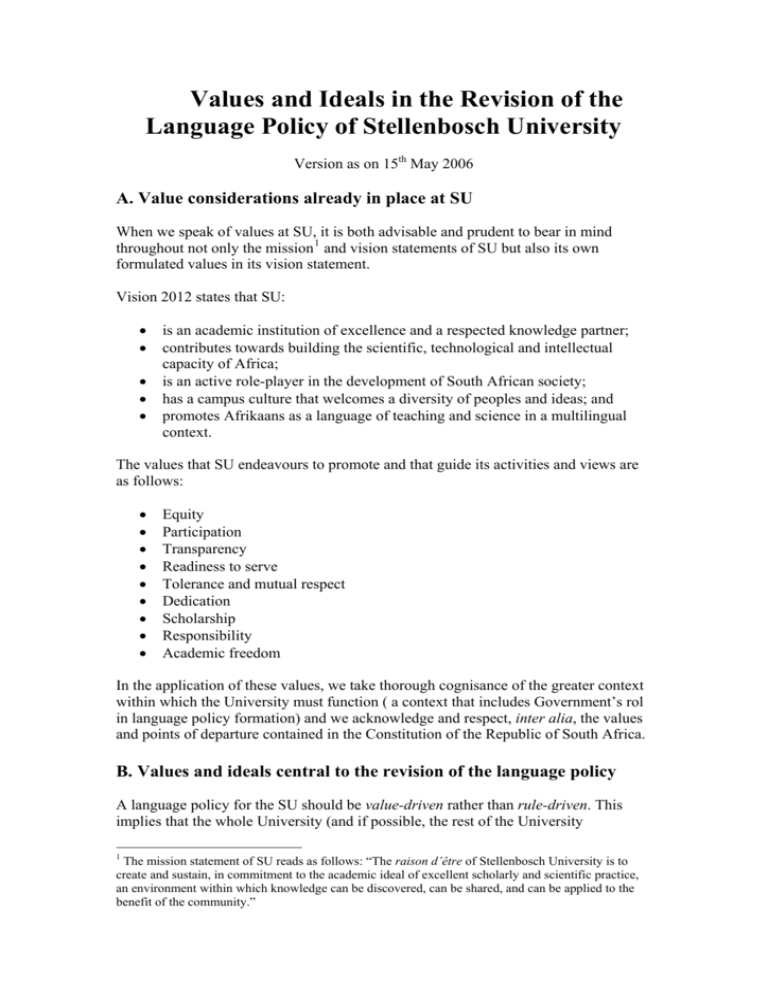
Values and Ideals in the Revision of the Language Policy of Stellenbosch University Version as on 15th May 2006 A. Value considerations already in place at SU When we speak of values at SU, it is both advisable and prudent to bear in mind throughout not only the mission 1 and vision statements of SU but also its own formulated values in its vision statement. Vision 2012 states that SU: • • • • • is an academic institution of excellence and a respected knowledge partner; contributes towards building the scientific, technological and intellectual capacity of Africa; is an active role-player in the development of South African society; has a campus culture that welcomes a diversity of peoples and ideas; and promotes Afrikaans as a language of teaching and science in a multilingual context. The values that SU endeavours to promote and that guide its activities and views are as follows: • • • • • • • • • Equity Participation Transparency Readiness to serve Tolerance and mutual respect Dedication Scholarship Responsibility Academic freedom In the application of these values, we take thorough cognisance of the greater context within which the University must function ( a context that includes Government’s rol in language policy formation) and we acknowledge and respect, inter alia, the values and points of departure contained in the Constitution of the Republic of South Africa. B. Values and ideals central to the revision of the language policy A language policy for the SU should be value-driven rather than rule-driven. This implies that the whole University (and if possible, the rest of the University 1 The mission statement of SU reads as follows: “The raison d’être of Stellenbosch University is to create and sustain, in commitment to the academic ideal of excellent scholarly and scientific practice, an environment within which knowledge can be discovered, can be shared, and can be applied to the benefit of the community.” 2 community) should by into or commit to a set of values on the basis of which a language policy will be developed. The following specific values 2 should, in conjunction with the values identified previously, be taken into account in the formulation, management and execution of the revised language policy: 1. Academic freedom: SU is primarily an academic institution and the language policy at SU therefore primarily serves an academic purpose. This value thus refers to the acknowledgement of the right of SU, in view of its own values and interests, to formulate a language policy independently and in an accountable way. 2. Participation: This value acknowledges the right of all members of the Stellenbosch University community who have an interest in participating in language matters to do so. This community includes, first and foremost, all the students and personnel currently at SU, but it also includes the alumni and donors of SU, and those institutions and individuals that, in one way or another, have an interest in or (can) benefit from the work done by SU. 3. The recognition of the Afrikaans language as a special yet vulnerable cultural value and commitment to the advancement of Afrikaans as an academic language within a multilingual context: This value should be applied at SU in a manner that: • is sensitive to the history of the language policy of South Africa; • endeavours to win friends for Afrikaans; and • acknowledges and expands Afrikaans as an asset belonging to all who speak and read it. 4. The recognision of Afrikaans as a national asset, as an illustration of the potential of a minority language to be developed in the context of a world language. 5. The recognision of multilingualism as an asset. 6. Optimal communication: The raison d’être of SU is scholarly and scientific practice. Language is there to serve this purpose – not vice versa. What a language policy endeavours to facilitate is optimal communication so that scholarly and scientific practice can take place on as strong a basis as possible. 7. Respect for differences in language and culture and commitment to learning from people who differ from us linguistically and culturally rather than allowing stereotypes to be strengthened. 8. Support by lecturers and students: It is extremely important that lecturers make as great an effort as possible, without compromising the language policy, to support students struggling to understand the language of instruction. Resources to assist lecturers in this (such as translation services, assistants to lecturers and auxiliary services at the Language Centre) should be 2 Although these values are not discussed strictly in order of preference, the order in which they are discussed does broadly represent the preferences currently held by the Task Group. 3 available as far as possible. In the same way, one could expect students to be equally supportive in order to make the effective management of a complex issue such as language policy possible. 9. Bi/multilingualism in lecturers and students: Both lecturers and students should make a special effort to ensure that they are proficient in both Afrikaans and English. Faculties should offer programmes that facilitate the realisation of this ideal (if need be with the assistance of the Language Centre). This ideal includes that Matie graduate has some degree of proficiency in at least three languages. 10. Integrity in the application of the language policy: The policy being applied with integrity implies that: • members of the University community accept and apply the policy as far as possible; • mechanisms be available to monitor the application of the policy; and • procedures for the receipt and handling of complaints on the language of instruction be clearly established. C. Value-related insights/intentions about which the Task Group has already reached consensus The following insights have thus far been reached through the discourse on the revision of the language policy: 1. The result of the language policy’s revision process would apply to all aspects of operation at the University where the use of language is involved. This applies in particular to the language used in undergraduate instruction at the University but also to that used in management, both internal and external communication, meetings, documentation and support services. There is no clarity at this stage on how, if at all, the language policy would apply to postgraduate instruction. 2. Rather than emphasising exceptions to a general rule 3 , we would henceforth rather formulate positively that which we already do and want to do in Afrikaans at the level of instruction at SU. 3. We distinguish between the position of Afrikaans at the level of instruction at SU and that which SU, over and above instruction in Afrikaans, already does and wants to do in respect of the “promot(ion) (of) Afrikaans as a language of teaching and science in a multilingual context” (refer to the last point of Vision 2012). 4. We confirm that undergraduate instruction is one of the most important environments at the University in which Afrikaans must be sustained as a 3 Compare, for example, the assumed logic of the current language policy and plan: General rule: Instruction at SU takes place in Afrikaans by default. Exception: As fully specified in the language plan as “language specifications”. 4 language of teaching and science. This, however, must take place in a manner that is pedagogically acceptable. 5. The development of Afrikaans as language of teaching and science is the responsibility of all role-players at SU. 6. In order to determine how much Afrikaans is (should be) used in undergraduate instruction, we need to have a reliable instrument in place to measure the percentage of total undergraduate instruction in Afrikaans. Such an instrument, however, is not yet at our disposal. 7. A principled decision must be made on whether the units identified for instruction in Afrikaans would be programmes, main subjects or modules (or otherwise). 8. With regard to the promotion of Afrikaans over and above the instruction issue, proposals such as the following will be investigated: • • • • • • • • Stronger financial support for language research as a point of focus at SU (including research on language teaching) The promotion of scientific publications in Afrikaans, but taking into regard the fact that accredited research publications are normally published in English The recognition of lecturers and students who make a special effort to hone their skills in the use of Afrikaans The creation of a high-profile chair in Afrikaans A “writers-in-residence” programme The establishment of a prestige literary award associated directly with SU A Stellenbosch fund for Afrikaans The promotion of Afrikaans over and above the teaching and research situation within the context of language as a focus area 9. A revised language policy should take account of the financial realities within which the University operates. In the policy formulation and accompanying budget processes, the principle that language costs money should also be borne in mind. Language Task Group 15 May 2006
